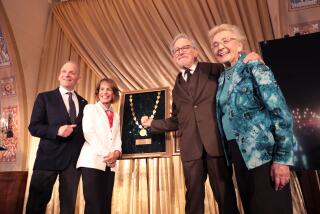‘Schindler Jew’ Tells of Prejudice, Pitching Story
- Share via
ORANGE — Students who went to a Chapman University lecture hall Thursday afternoon to hear a Holocaust survivor speak were quickly set straight.
“Survivors survive car accidents and fires,” Leopold Page told his audience. “We survived a cataclysm of human history. We are witnesses to the truth.”
Those expecting an hour of grisly accounts about life under the Nazis in Poland’s Krakow ghetto were also in for a surprise.
Page, the Beverly Hills luggage salesman who spent 40 years haranguing movie makers and writers to tell the story of Oskar Schindler, had listeners laughing at anecdotes about his plight to get the tale told.
He recalled how he would offer cut-rate discounts on handbags to relatives of filmmakers, for example. And the one producer who bought the story in the mid-1960s came back with a script so badly written that Page felt compelled to buy back the rights.
The only hint of tears in Page’s eyes came when about 100 people sang “Happy Birthday” to the speaker, who turned 83 on Wednesday.
“I’m sorry I’m not talking about the tragedy,” Page said near the end of his talk. “How can I tell you how a child was ripped from a mother’s hands and the mother and child were shot? How can you believe that? You wouldn’t believe it.”
With his crisp blue suit, gold-rimmed glasses and gregarious manner, the tanned, stocky speaker could have been any successful Los Angeles businessman.
He was born Poldek Pfefferberg in Poland. His career as university professor ended abruptly in 1939, when he joined the Polish Army to fight the Nazis. It was the same year he met Schindler, who decades later became famous as the hero of “Schindler’s List.”
Schindler, a Nazi Party member who ran a factory near Krakow, was credited with saving the lives of nearly 1,300 Jews by “purchasing” them from a drinking buddy, a Nazi commandant. He submitted a list of “needed” workers for his factory and the commandant complied, thus saving the employees from concentration camps.
After the war, Page and his wife emigrated to the United States, settling in Los Angeles.
*
He told many people his story but did not meet the writer who would listen until 1980.
Australian author Thomas Keneally was killing time before a flight to Sydney, when he wandered into Page’s leather goods store on Beverly Boulevard to buy a briefcase--and came out with the story that would be the basis for the book, published in 1982, and the 1993 Steven Spielberg movie.
At the end of the war Page had made Schindler a promise: “I said, ‘You really performed a miracle. I will go to America and do something for you. I will make you a household name.’ I thought this would happen right away, but brother! Forty years. Nobody wanted to listen.”
Millions have now read the book and seen the 1993 Spielberg movie, which won an Academy Award for Best Picture.
Page, still clearly euphoric over his success in getting the story out, said he uses his newfound popularity as a speaker to urge schoolchildren and college students to find and overcome their own prejudices.
Now that he has the ears of groups all over the country, he finds himself unable to explain anti-Semitism, except maybe as jealousy, he said.
“I can’t analyze this prejudice,” he said. “I can only present myself to all schools and tell [students] that love is easier than hate . . . Maybe they will open their eyes and say hatred, ignorance, lack of respect doesn’t have a place in human relations.”
More to Read
Only good movies
Get the Indie Focus newsletter, Mark Olsen's weekly guide to the world of cinema.
You may occasionally receive promotional content from the Los Angeles Times.










